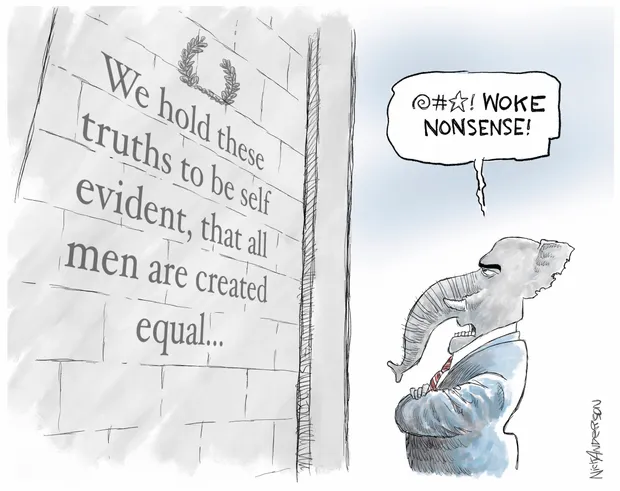I’ve been fascinated with words pretty much my entire life.
It began with my parents always saying “look it up” when I asked what a word meant. I was a voracious reader then and still am, which added to it. I’m convinced that reading through the entire Sherlock Holmes works multiple times took my understanding and appreciation of words to another level.
In 1976, I read and loved Edwin Newman's book “A Civil Tongue,” where he skewered the “gelatinous verbiage” of Washington and the social sciences, especially that used in news broadcasts.
Then there was Lakoff’s “Don't Think of an Elephant” in 2004, just about the time I got more politically active. Lakoff pointed out the use of code words in politics, and how using those same code words actually helps perpetuate the frame the word stands for.
So it is with some wonder and amusement that I have observed the word “woke” becoming a pejorative. Since when is being awake a bad thing?
In the past, it was common to use the phrase “wake up!” to tell people they were blind to injustice or corruption. This got me to thinking. If a candidate such as Daniel Cameron or Ron DeSantis says they are running against the “woke agenda,” what exactly are they saying? And even more to the point: what do their listeners understand them to mean?
According to multiple dictionaries I consulted (“look it up!”), the term woke started years ago in Black circles to mean “awake to the possibility of racial violence.” It then broadened to mean “alert to racial prejudice and discrimination.”
And finally, in the 2010s, it came to encompass a broader awareness of social inequalities such as sexism, and has also been used as shorthand for American Left ideas involving identity politics and social justice, such as the notion of white privilege and slavery reparations for African Americans.
Woke, then, is generally accepted to mean being aware of the ongoing issues of racism, sexism, homophobia, white supremacy, and white privilege, and the need for social justice. So when a candidate rails on about opposing the woke agenda, what are they really saying?
They are saying they support racism, sexism, homophobia, and white supremacy. It’s as simple as that.
Now of course, if you ask them if that’s what they mean, they will deny it. They will say they are running against being too aware of those things. They will say they don’t want to be extreme in dealing with those issues.
But again, what does that mean? It means stop talking about those things. Stop trying to do anything about those things. “No, no, no, no, no, I can't hear you!”
Just as Edwin Newman provided translations of some of the most pernicious phrases of his day, we need to provide and promote translations of the words of right-wing fear mongers like Cameron and DeSantis. We need to make it clear.
If they say they are running against “woke,” what they are really saying is: We don’t want to hear about those things. We don’t want to think about those things. We want to keep things the way they are – and that includes keeping hate in place.
--30--








